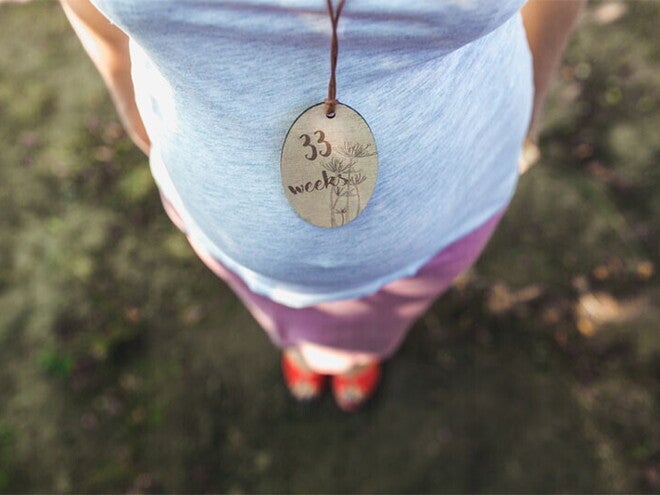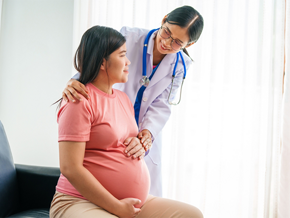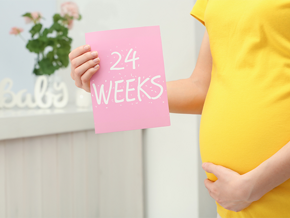
33 Weeks Pregnant: Your Baby’s Growth Spurt and What You'll Feel
Are you feeling more distinct jabs under your ribs? At 33 weeks pregnant, your little one's growth spurts mean you’ll feel even stronger kicks and flutters. It may also mean experiencing more noticeable symptoms as your body prepares for labor.
Here's what you can expect about your baby's development, common symptoms, and vital signs to watch for during Week 33 of your pregnancy.
Your Baby’s Development at 33 Weeks
Your baby is now about 43.7 cm (17.2 in) long from head to heel and weighs roughly 1.9 kg (4.2 lbs.), the size of a pineapple. They'll continue to gain weight rapidly over the next several weeks.
Position in the womb
By now, your baby has likely settled into the head-down (cephalic) position in preparation for birth. Your doctor will monitor your baby's position during your prenatal check-ups. Don't worry if your baby hasn't turned yet because there's still time.
Brain and immune system development

Your baby is having a major growth spurt, and they're borrowing your antibodies to build their first immune system!
Your baby's brain is growing at an incredible rate, which is why their head circumference is also expanding quickly. A study published in Cureus shows that this rapid head growth during the third trimester is a sign of healthy development.
Their immune system is also getting a boost as you pass antibodies to your baby. A recent study on maternal immunization shows that this process gives your newborn protection during their first weeks of life.
You might also start to notice a predictable rhythm to your baby's movements as their sleep and wake cycles develop. You'll learn their schedule by feeling energetic kicks and wiggles when they're awake, followed by periods of quiet stillness when they're asleep.
Common Symptoms at 33 Weeks Pregnant
At 33 weeks pregnant, symptoms may vary as your body accommodates your growing baby.
Shortness of breath
As your uterus expands, it can press on your diaphragm, making it harder to take deep breaths. Try to practice good posture to give your lungs more room.
While mild breathlessness is typical, call your doctor if it suddenly becomes severe. Seek immediate medical attention if it's accompanied by other symptoms like a persistent cough, a racing pulse, or chest pain, as this could signal a more serious issue.
Constipation
Pregnancy hormones can slow down your digestive system, leading to constipation at 33 weeks pregnant. According to a 2024 systematic review in BMC Pregnancy and Childbirth, this condition affects up to 32.4% of expectant mothers! The safest way to get relief is to increase your fiber intake and drink plenty of fluids.
Appetite changes
Loss of appetite in pregnancy is common especially as your baby grows and puts more pressure on your stomach. You may feel full quicker than usual. To ensure you and your baby continue to get enough nourishment, try dividing your meals into five or six smaller portions throughout the day.
Braxton Hicks contractions
To determine if you're experiencing these practice contractions, observe their pattern. The American College of Obstetricians and Gynecologists (ACOG) states that these contractions are typically irregular and don't increase in intensity. You'll often find they disappear if you change your position or drink a glass of water.
Warning Signs You Shouldn’t Ignore
You should never ignore the following symptoms, as they could be signs of pregnancy complications.
Severe or persistent abdominal pain
Severe abdominal pain could be a sign of a serious issue like preterm labor or placental abruption. Unlike other pregnancy aches, this pain is often severe, constant, or comes in regular, intensifying patterns.
A significant decrease in your baby’s movement
While your baby has less room to move, you should still feel regular movements. If you notice a significant drop in activity, perform a kick count. To do this, lie on your side, note the time, and count each distinct movement (like a kick, roll, or flutter) until you reach 10.
You should feel those 10 movements in two hours or less. If you don't, it's essential to contact your doctor or midwife immediately for guidance.
Vaginal bleeding
Any amount of bleeding during this stage needs immediate medical attention. Whether it appears as light spotting or a heavier flow, it can be a sign of issues with the placenta or early labor.
Signs of preeclampsia
It's crucial to watch for signs of preeclampsia, a serious blood pressure condition during pregnancy. Call your doctor immediately if you experience any of its key warning symptoms. According to the International Society for the Study of Hypertension in Pregnancy (ISSHP), these include:
- A severe headache that doesn't go away
- Vision changes, such as flashing lights or blurred vision
- Sudden swelling in your hands or face
Nutrition Tips for a Healthier Week 33
Eating healthy is vital during this final stretch. Here are a few tips to ensure you're getting the nourishment you both need:
- Prioritize nutrient-dense foods. Choose meals and snacks packed with high-quality vitamins, proteins, and healthy fats to support you and your growing baby.
- Boost brain development. Support your baby's rapidly growing brain by including plenty of omega-3 fatty acids in your diet.
- Follow a trusted guide. To help plan your meals, you can use the Food and Nutrition Research Institute’s (FNRI) Dietary Reference Intakes to meet your daily calorie and nutrient goals.
Tips for the Final Weeks

As your due date nears, feeling prepared brings peace of mind. Prioritize rest, finalize your birth plan, and pack that bag!
With only a few weeks to go, focus on staying comfortable and feeling prepared.
Get plenty of rest
It might be harder to find a comfortable sleeping position, but rest is more important than ever. Try sleeping on your side with pillows for support.
Pack your hospital bag
Now’s a great time to pack your hospital bag with essentials for you, your partner, and your baby. Not sure what to pack? Check out this helpful checklist.
Finalize your birth plan
Review and finalize your birth plan with your partner and healthcare provider. Being clear about your wishes can help you feel more confident as you approach labor and delivery.
At 33 weeks pregnant, you’re at the home stretch where your baby is busy with their last crucial developments. Now is the perfect time to prepare for giving birth or to create a nurturing home environment for your newborn. Feeling organized will help ease any anxiety during these final weeks!
Join the ParentTeam Moms and Dads Facebook group and share the worries and excitement of being 33 weeks pregnant with other parents.
References
American College of Obstetricians and Gynecologists (ACOG). "How Your Fetus Grows During Pregnancy." ACOG. Last modified January 2024. Accessed July 9, 2025. https://www.acog.org/womens-health/faqs/how-your-fetus-grows-dur ing-pregnancy
American Pregnancy Association. "Constipation During Pregnancy." American Pregnancy Association. n.d. Accessed July 9, 2025. https://americanpregnancy.org/healthy-pregnancy/pregnancy-health-wellness/constipation-during-pregnancy/
Atyeo, Caroline, and Galit Alter. "The Multifaceted Roles of Breast Milk Antibodies." Cell 184, no. 6 (March 18, 2021): 1486–99. Accessed July 9, 2025. https://doi.org/10.1016/j.cell.2021.02.031
Cleveland Clinic. "Fetal Development: Stages of Growth." Cleveland Clinic. Last reviewed March 19, 2024. Accessed July 9, 2025. https://my.clevelandclinic.org/health/articles/7247-fetal-development-stages-of-growth
Cleveland Clinic. "Pregnancy Constipation." Cleveland Clinic. Last reviewed October 19, 2021. Accessed July 9, 2025. https://my.clevelandclinic.org/health/diseases/21895-pregnancy-constipation
Langel, Stephanie N., Maria Blasi, and Sallie R. Permar. "Maternal Immune Protection Against Infectious Diseases." Cell Host & Microbe 30, no. 5 (May 11, 2022): 660–74. Accessed July 9, 2025. https://doi.org/10.1016/j.chom.2022.04.007
Mayo Clinic. "3rd Trimester Pregnancy: What to Expect." Pregnancy Week by Week. Last modified February 7, 2025. Accessed July 9, 2025. https://www.mayoclinic.org/healthy-lifestyle/pregnancy-week-by-week/in-depth/pregnancy/art-20046767
National Health Service (NHS). "Week 33." Start for Life. n.d. Accessed July 9, 2025. https://www.nhs.uk/start-for-life/pregnancy/week-by-week-guide-to-pregnancy/3rd-trimester/week-33/
Nemours KidsHealth. "Why Do Some Women Feel Short of Breath During Pregnancy?" Medically reviewed by Elana Pearl Ben-Joseph. Last reviewed January 2023. Accessed July 9, 2025. https://kidshealth.org/en/parents/breathing.html




























